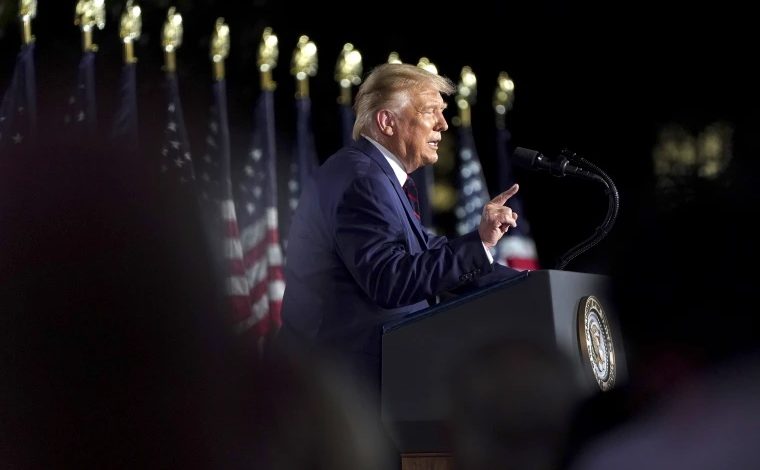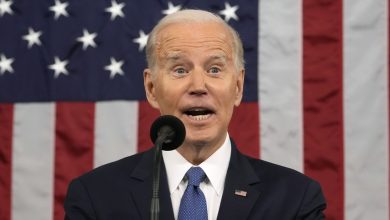Behind the Curtain: Trump’s imperial presidency in waiting

President Trump, if re-elected, plans to immediately test the boundaries of presidential and governing power, knowing the restraints of Congress and the courts are dramatically looser than during his first term, his advisers tell us.
Why it matters: It’s not just the Supreme Court ruling on Monday that presidents enjoy substantial legal immunity for actions in office. Trump would come to office with a Cabinet and staff pre-vetted for loyalty, and a fully compliant Republican coalition in Congress — devoid of critics in positions of real power.
That’s a big reason many Democrats worry President Biden is making one of the biggest gambles in U.S. history by staying in the race amid acute concerns about his age.
The big picture: Trump promises an unabashedly imperial presidency — one that would turn the Justice Department against critics, deport millions of people in the U.S. illegally, slap 10% tariffs on thousands of products, and fire perhaps tens of thousands of government staff deemed insufficiently loyal.
He’d stretch the powers of the presidency in ways not seen in our lifetime. He says this consistently and clearly — so it’s not conjecture.
You might like this or loathe this. But it’s coming, fast and furious, if he’s elected.
Thanks to Monday’s Supreme Court ruling, Trump could pursue his plans without fear of punishment or restraint.
What to watch: To hear Trump and his allies tell it, this is how early 2025 would unfold if he wins:
- A re-elected Trump would quickly set up vast campsand deport millionsof people in the U.S. illegally. He could invoke the Insurrection Act and use troops to lock down the southern border.
- In Washington, Trump would move to fire potentially tens of thousandsof civil servants using a controversial interpretationof law and procedure. He’d replace many of them with pre-vetted loyalists.
- He’d centralize powerover the Justice Department, historically an independent check on presidential power. He plans to nominate a trusted loyalist for attorney general, and has threatened to target and even imprison critics. He could demand the federal cases against him cease immediately.
- Many of the Jan. 6 convicts could be pardoned— a promise Trump has made at campaign rallies, where he hails them as patriots, not criminals. Investigations of the Bidens would begin.
- Trump says he’d slap 10% tariffson most imported goods, igniting a possible trade war and risking short-term inflation. He argues this would give him leverage to create better trade terms to benefit consumers.
- Conversation would intensify about when Justices Clarence Thomas, 76, and Sam Alito, 74, would retire.
Lists of potential successors are already drawn up.
President Biden said last month that “the next president is likely to have two new Supreme Court nominees.”
If Trump were to win and the two oldest justices retired, five of the nine justices would have been handpicked by Trump.
Top Democrats privately predict Republican majorities in the House and Senate if Biden loses.
Most of Trump’s most prominent critics — Mitt Romney, Liz Cheney, et al. — will be gone. Even the few who remain, including Sen. Mitch McConnell (R-Ky.), will be substantially less powerful.
Trump would be backed by an overwhelmingly Trump-friendly Senate and House — loaded with loyalists, top to bottom. Many were elected since his 2016 win, and many thanks to his endorsement.
What they’re saying: Sen. J.D. Vance (R-Ohio), a top prospect as Trump’s VP, told us Trump would have more allies — and more loyal allies — in Congress this time.
“You have to ask yourself: How many true allies of the agenda existed in the United States Capitol in January 2017, and how many will exist in January of 2025?” Vance told us.
“You have a Republican Party that, in some ways, was divided against itself in January of 2017,” Vance added. “I think now it recognizes that Trump is effectively leader of the party. And you’ll see that in governing style and certainly in agenda,” with “much less infighting between Republicans, which will make us much more effective as a governing coalition.”
The freshman senator said that while Trump was “very much a newcomer to politics” when he ran the first time, he now “understands how to pull the levers of power much better, because he’s coming at this as a subject matter expert.”
The media would investigate, report, and illuminate all of it — but probably with less impact. A second Trump term would start with TV ratings in the tank, mainstream media shrinking, and public attention shattering into dozens of information ecosystems, many built around popular and often partisan celebrities.
So the ability to do more with fewer real restraints is real — and hard to change.
The bottom line: Think of Trump 2025 as a better prepared, much better organized, much more powerful version of Trump 2017 — minus Republican brakes and any mystery about immunity.



